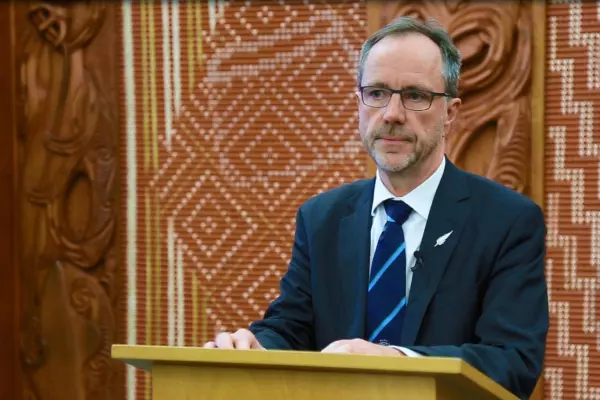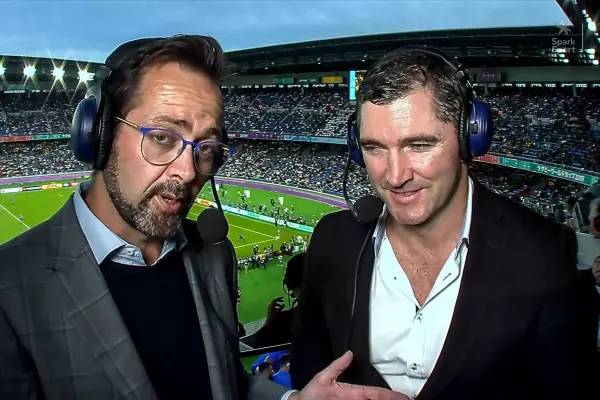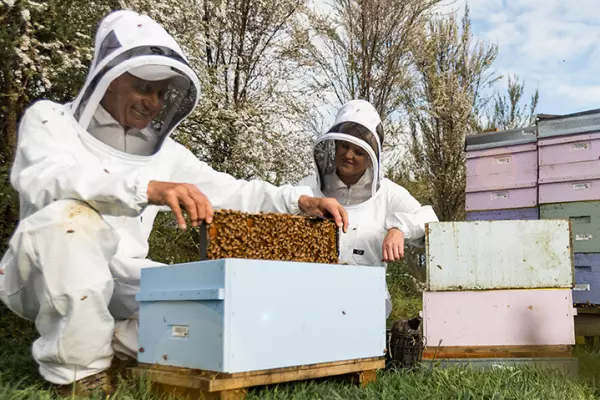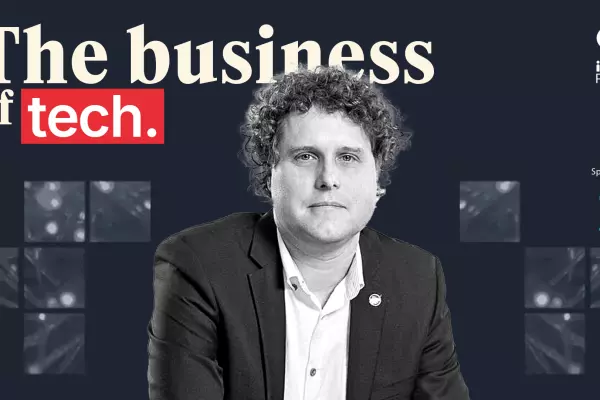Champions of the knowledge economy please take note – the primary sector is far from dead, it just needs to keep reinventing itself. One business showing us how is an Auckland-based company making air filters out of specially-bred wool.
Lanaco was founded by Nick Davenport who specialises in developing applications for materials and has a background in manufacturing plastic components.
This week, if the weather gods play their part, Lanaco filters will be aboard a Nasa rocket heading to the far side of the moon and back – a record for a New Zealand export that might even make Rocket Lab jealous.
The journey started more than a decade ago, when Davenport set his sights on wool after deciding he wanted to create a business that really fitted NZ.
“In NZ, you deal with markets an inch deep and a mile wide, so you get to see everything.”
Fading legacy
Davenport could see we had a legacy of wool science and a competitive advantage in farming it.
"But it was fading," he said.
“What I was exposed to was a whole range of industrial markets and business-to-business sales, and I could see the opportunity to create products that behaved like many of the plastics I was using, but from wool.”
It says a lot about our economic future that the first employee he hired was a research scientist: a PhD student based at Auckland’s Centre for Advanced Composite Materials, by the name of Shaun Tan.
Together, they delved deeply into wool science. “We just dug to see how we can create really valuable materials from wool that weren’t carpets or garments, but would be in this industrial space," Davenport said.
They identified several opportunities but narrowed it down to air filtration, because wool “performed exceptionally well in that arena” and appealed because of human health benefits.
A prime example is a firefighting respirator a Nasa contractor would later develop using their product for manned lunar missions.
A plastic filter would clog after 10 minutes, but make it from Lanaco’s wool filter and it could be used for an hour or more.
The famous line “Houston we have a problem” stemmed from a fire in Apollo 13’s capsule and if such an emergency were to happen again, Nasa’s astronauts will literally be able to breathe easily, thanks to woollen air filters made in NZ.
Logical fit
Having decided he wanted to work with wool, the first challenge Davenport faced was falling incomes for farmers.
“They were heavily invested in their land and existing genetics and to get them to do anything different, we’d have to give them a decent income, a long-term sustainable income.”
This meant creating high-value products with long-term potential, so health markets seemed to be the logical fit.
Ironically, because wool incomes were down, farmers had cut the levies funding AgResearch, forcing it to put the manufacturing assets it was using to develop new technologies up for sale.
“So, we bought them and decided to have a play to see what we could do to make these products.”
Another important step was teaming up with Otago sheep breeder Andy Ramsden six years ago, to start a breeding programme informed by Lanaco's research into wool fibres and what characteristics contributed to better-performing air filters.
“We realised that if you could set a breeding objective for a specific performance, then you could continue to improve that characteristic via natural selection and managing parentage.”
Local hero
As a filter media manufacturing business, Lanaco was very well positioned at the outbreak of covid. Davenport said the company was approached by many countries because no one outside China had filter media that could be used.
As the auditor general noted, NZ was one of many countries that found it difficult to secure supplies of personal protective equipment (PPE) in what rapidly became an overheated market.
Surgical masks, which had cost 4-8 cents each in 2019, ballooned to between 90 cents and $1 each on the international market.
Government officials began reaching out to local companies such as Lanaco to see if they could become PPE manufacturers.
Davenport’s previous company was already making filter elements for what’s called “consumer and urban pollution masks”, so he bought that equipment and set up a mask manufacturing line underpinned by a letter of intent from the Ministry of Health and the fact that the ministry had been cut off from its previous supply lines due to covid.
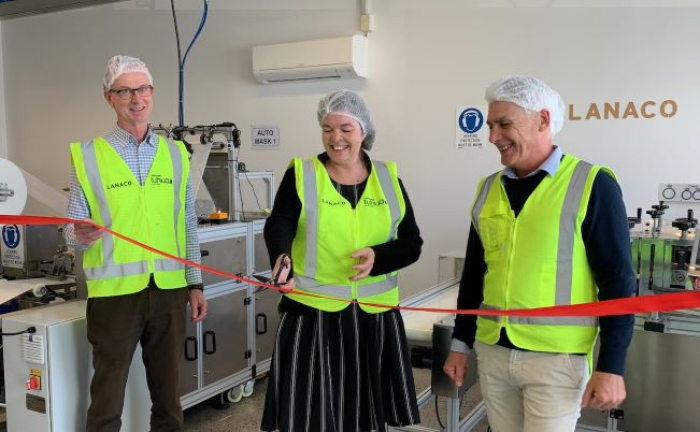 Prime minister's chief science advisor Juliet Gerard opens Lanaco's mask manufacturing plant with Nick Davenport (right). (Image: Supplied)
Prime minister's chief science advisor Juliet Gerard opens Lanaco's mask manufacturing plant with Nick Davenport (right). (Image: Supplied)Lanaco began selling masks to the public and food processors exporting to China.
It picked up the contracts for the Olympic and Commonwealth Games teams, whose managers credited masking as one of the pillars of their success.
“No small feat despite there being a surge of infection at each event.”
For a while in 2020, Lanaco was the darling of the government – its new plant was opened by the prime minister’s chief science advisor and its new respirators were launched at a function in the Beehive.
But eventually, the deal turned sour.
Ticked all the boxes
As the ministry’s understanding of technical specifications for PPE developed, so did what they wanted from Lanaco. The company felt like the goalposts were constantly shifting – if it could get any clarity at all from officials.
Davenport said it was supported by a very spiky local market that went up and down with each lockdown or surge in cases, but what it really needed was a backbone of ongoing supply to the health system.
He said its product had the advantage of being based on local supply chains, was better for the environment compared with imported masks that ended up in landfills or were exported for incineration, and incorporated research from mask-fit trials on our ethnically diverse population.
“We thought ‘hallelujah', here’s something that aligns with government’s needs, New Zealand health needs and our ethnic differences for Māori and Polynesians – it ticked all the boxes.”
These factors and the letter of intent gave them a lot of confidence to invest, but it all came to an end when the ministry terminated the relationship without reason and Lanaco had to lay off staff.
Lanaco insisted it met the ministry’s technical specifications and had provided evidence of its claim to BusinessDesk, including certification documents and correspondence with health officials.
When BusinessDesk approached the ministry to get a straight answer on whether there were specifications it believed Lanaco hadn’t met, it issued a statement that didn’t respond to that question.
BusinessDesk again asked which of its specifications Lanaco hadn’t met and was told “we have nothing further to add at this time”.
If the specifications aren’t really the issue, then why did the government turn its back on Lanaco?
The answer seems to be expediency – in 2020, it thought it needed businesses like Lanaco, but, by 2021, it decided it could just rely on imports and turn its back on the local businesses that had scrambled to answer the nation’s call for help.
Not so over the Tasman, where both federal and state money was pumped into developing a local PPE industry with the aim of securing Australia’s “sovereign capability”.
Pivoting back
Davenport is looking forward, not back, and told BusinessDesk the outlook was very positive.
He said the company has a loyal following of local users, including top-tier sports teams, and it's about to launch a new product based on what it learnt from the pandemic.
He said the blue triple-folded surgical masks, which most of the public uses, do nothing to protect the wearer: "It just stops you spitting on other people." It is the P2 (or N95) respirator mask that protects the wearer.
In between these two kinds, there’s a very big gap that Lanaco hopes to fill with another world-first product that has all the design and fit of a P2 mask but “which is about 10-times easier to breathe through”.
Masks may have occupied Lanaco over the past two and a half years, but now the company is pivoting back into its mainstream business.
When BusinessDesk spoke to him, Davenport had just returned from the World Filtration Congress in San Diego in the US.
He's very actively developing leads in the US where Lanaco is looking to commercialise its product in ventilation systems, home appliances, automobiles and medical devices.
That has given the company confidence to take on more staff again – mainly scientists and business-development people.
“The objective here is to get large volumes of wool going offshore from New Zealand at high value. “That's our original plan and that's what we're working on executing still – now that we've got through and survived the Ministry of Health.”
If all goes well, NZ wool might even make it to Mars one day.




